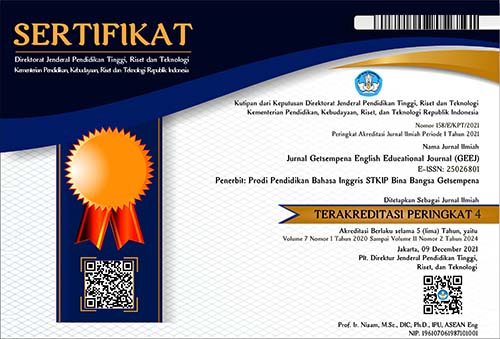THE USE OF GUESSING GAME TO IMPROVE STUDENT’S SPEAKING SKILL
Abstract
Speaking is activity of two or more people in sending and receiving information or messages in oral communication. The reason for teaching speaking to students is because it belongs to the basic language skill in English. In speaking classes, the teacher usually give a dialogue of a certain topic, then the students are being to practice and memorize the dialogue with their friends and finally present the dialogue in front of the class in turn. It means that to understand the dialogue, the students must have the ability in vocabulary, grammar and pronunciation. Because of that, speaking is very important to be taught to the students.This study aimed to find out whether the use of guessing game is effective. The sample of the study consist of 27 students in one class. The data in this research were conducted by using pre-test and post-test. The result from the research showed that there is significant difference between the students who are taught speaking by using guessing game and those who are taught speaking by using traditional approach. The finding indicated that there is a significant difference between the score of pre-test was 53, 6 and post-test was 82, 9. From this research it was known that t – score is highest than t – table. It’s mean that this alternative hypothesis (Ha) is accepted. Thus clear that the difference of the two means gained score was significant.
References
Burns, Chistine (2012) Teaching Speaking : A Holistic Approach. New York. Cambridge University Press
Dogar A.H, Azeem M. Bahsiar M. (2011). Factor Effective Students’ English Speaking Skill. British Journal of Arts and Social Sciences ISSN: Pakistan 2011.
Heaton.J (2004). Writing English Language Tests. New York: Cambridge University press
Hybel, D. (2001) Understanding Speaking Interaction. New York: Cambridge University Press.
Jordan (1997). Research Design Methodology. London: Sage Publication
Kayi. 2006. Teaching Speaking: Activities to Promote Speaking in a Second Language.
Klippel, F. (2012) Keep Talking: Communicative Fluency Activities for Language Teaching, Cambridge University Press.
Muklis, S. (2003). Language Skill in Action a Paper Presented in TEFL object at Graduated.
Savignon, Sandra J. (1991) Teaching for Communication. English Teaching Forum.
Scoot, Roger, (2003), Speaking Communication In the Classroom, Application and Methods for Communication Approach, Ed.
Thornbury, S., Slade, D. (2006). Conversation: from description to pedagogy. Cambridge University Press.
Wright, (1984), Games for Language Learning. Cambridge University Press.

























